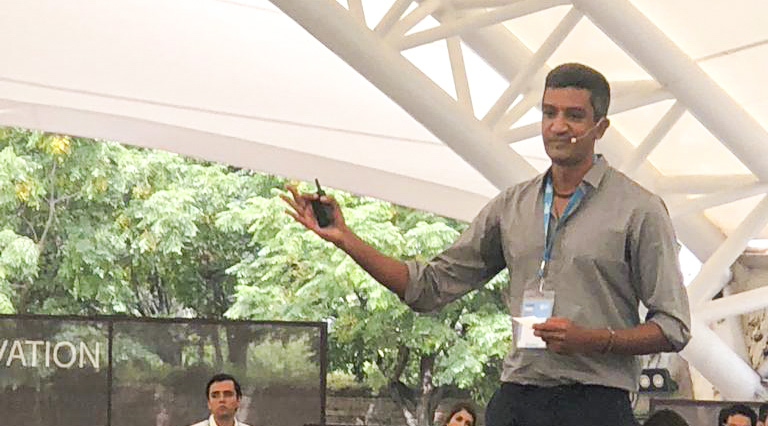Professor discusses his new book which explores modern internet use

Professor Ramesh Srinivasan’s new book, “Beyond the Valley: How Innovators around the World are Overcoming Inequality and Creating the Technologies of Tomorrow” addresses the internet’s influence on society and in the field of information studies. (Courtesy of Ramesh Srinivasan)
By Jessica Li
Nov. 12, 2019 10:42 p.m.
Fifty years ago, the internet was born at UCLA.
Today, it can be hard to imagine a world without it.
Nevertheless, professor Ramesh Srinivasan said the increasing prevalence of the internet brings growing changes to society, specifically to the field of information studies. The professor of information studies addresses this in his new book, “Beyond the Valley: How Innovators around the World are Overcoming Inequality and Creating the Technologies of Tomorrow.” The book, which was released in October, focuses on the internet’s influence as a double-edged sword on society.
Through interviews with prominent political activists and intellectuals, Srinivasan said the book offers warnings about the manipulative ways the internet can be used. However, he said it also shines hope on the community-building power of the internet across the world.
“The theme of the book really is, ‘How do we ensure that this digital world, that this world of technology can support business interests, but not at the cost of everything else,’” Srinivasan said. “These are themes that you see every single day in the mainstream media, so that’s why I wrote it, because it’s so timely and I had a lot of things to say about it.”
[Related: Daily Vox podcast “Today, Explained” brings deeper context to news stories]
As a former engineer and artificial intelligence developer, Srinivasan straddles both the designer and consumer perspectives of technology. On one hand, he said he understands the “private” online side of technology companies: the inner workings of Silicon Valley and other technology hubs. On the other, he looks “beyond the valley” by working with communities in various countries such as Mexico, Uganda and Kenya, allowing Srinivasan to experience the consumer side of the technology he took part in creating.
And, given the immense reach of the online sphere, Srinivasan includes diverse applications of technology in “Beyond the Valley.” Examining themes ranging from the U.S. political climate to automation to AI and the gig economy, Srinivasan said he aims to present the role of digital technology as a caterer to communities, corporations and the general consumer.
“The key is really opening up who has power to influence the design of technologies rather than continuing to be black boxes that we’re finding out increasingly are behaviorally manipulating us,” Srinivasan said.
Srinivasan labels this trend “technologization” – the expanding importance of technology in society. It impacts the lives and privacy of both offline and online citizens on issues such as surveillance cameras and facial recognition, smartphones detecting health data or applications like Uber and Airbnb, Srinivasan said.
“All of us are our subjects in a sense of the book, because all of us are connected to the internet,” Srinivasan said. “The internet doesn’t discriminate in the sense that everyone who has some connection to digital technology or network technology is a subject of these themes that are addressed in the book.”
In making his writing style more journalistic than academic, Srinivasan said he hopes to drive home the message about the importance of technological literacy. For instance, assistant English professor Daniel Snelson said how Srinivasan tries to see the “invisible” influence of the internet already overlaps with his own work aiming to find the “invisible” in art and literature.
“What’s so inspiring about the book is that he makes these great arguments for how we could imagine the internet otherwise,” Snelson said. “The internet, as we know it, never needed to be the way that it is, but I think we often presume that it couldn’t be otherwise.”
[Related: UCLA music school admin to speak on Orwellian power of streaming industry]
Within a department concerned about social justice, Srinivasan’s work highlights the specific impacts of social media and technology, as well as informs the general population of such ramifications, said Anne Gilliland, professor and associate dean of UCLA’s Department of Information Studies. Srinivasan’s book is only the latest in a string published by faculty in the UCLA Information Studies department that highlights the growing implications of technology, she said.
“UCLA has a very diverse undergraduate student population,” Gilliland said. “We know that many of the organizations that are involved in information technology and data work are not particularly diverse and this is part of Professor Srinivasan’s argument: How do you bring different kinds of people and different ways of thinking into those spaces?”
Nonetheless, Srinivasan said the ultimate message of his book is to explore who influences the design of technologies and how internet use can be democratized. Delving into how the general public can take control of the online world over a select few, Srinivasan said, offers glimmers of hope as to how he thinks the public can take over the internet. UCLA Information Studies faculty like Gilliland echo Srinivasan’s optimistic outlook.
“I think it’s hard to have hope in the face of the way that technology works today and the way that politics works today, but the kind of work (like Srinivasan is doing) that looks for real ways that the world could change is really inspiring,” Snelson said.


